Brevard County opens door to potential lawsuits because of public safety ordinances
Brevard County is the most recent local government body to pass a law limiting the exchange of items, such as cash, between motorists and pedestrians in the public right of ways.
Supporters claim the measures protect the public from harm, but opponents believe the new rules are nothing more than a mask hiding the true intent — to limit the visibility of the poor begging in public.
“This is going to criminalize the act of asking for help,” said Stacey Patel, the founder of Brevard Mutual Aid, an organization that connects neighbors across Brevard to help one another.
The county, along with the cities of Melbourne and Palm Bay, have joined others throughout the country to limit what they consider an eye sore for the community. In doing so however, they have opened themselves up to the possibility of a lawsuit challenging the constitutionality of their ordinances.
Panhandling banned: Brevard County borrows playbook from Melbourne
Commissioner Curt Smith proposed the ordinance in late March. It was made into law just over a month later, prohibiting people from loitering on roads and interfering with traffic, or lingering along the right of ways to exchange items, including money, with motorists stopped at intersections.
The county's measure borrows elements from a similar ordinance passed by city of Melbourne officials in the fall of 2021. That ordinance bans both motorists and pedestrians from making physical contact with one another or exchanging items while on sidewalks or public right of ways.
The Brevard County Sheriff's Office chief counsel, Laura Moody, helped draft the county law.
Officials claim their ordinances are necessary because they enhance pedestrian safety on the roads.
“This is a deterrent, really,” Smith said, “We are trying to deter people from doing something that is unsafe. We are trying to do something that will protect people from themselves.”
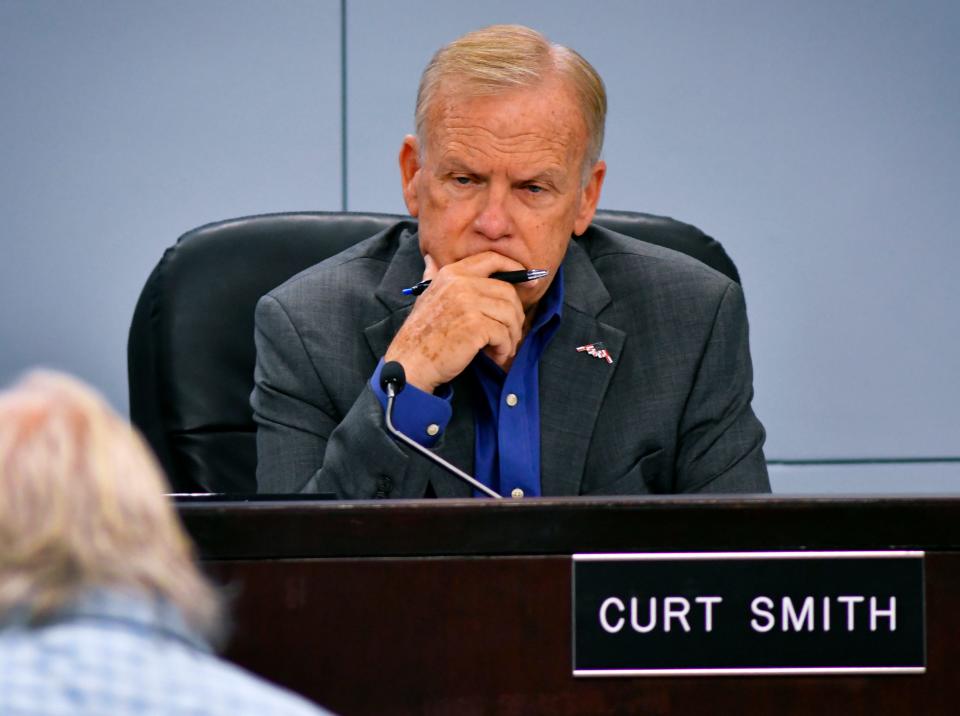
The county’s ordinance states that Florida ranked third in the country for pedestrian fatalities during the first six months of 2020 with 332. However, there are a dearth of statistics tying panhandling to pedestrian fatalities causing vehicular collisions.
In Palm Bay, officials also pointed to the behavior of panhandlers as a reason for the restrictions.
'Panhandling ban' appeal: Homeless woman makes heartfelt appeal to Brevard County Commission
Like many areas around the country and state where the cost of living are soaring, Palm Bay began to experience an increase in homelessness population, as well as the number of panhandlers in the street.
“They were literally at about every intersection, in the medians,” said Commander Jeff Spears, the public information officer for the Palm Bay Police Department. “What we started to end up seeing was that, as people started to deny them, they started to become aggressive. We had reports where these panhandlers were kicking cars. They were hitting windows. They were spitting on cars.”
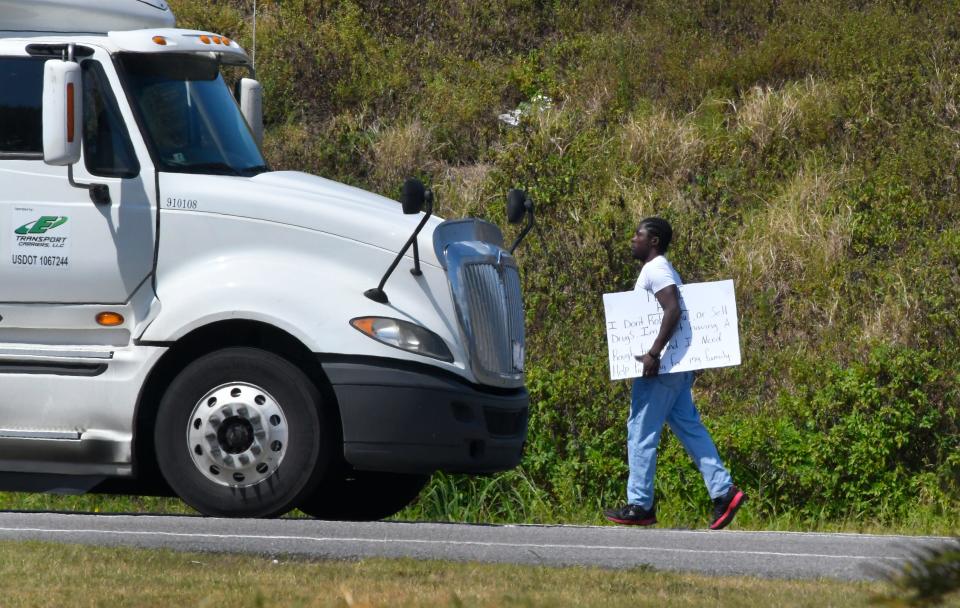
Palm Bay turned to an already existing statute they had on the books as the tool through which they could deal with panhandling complaints. All they needed to do was enforce the rule prohibiting solicitation on the public right of way.
Spears said they could not tailor the rule to address only those demonstrating aggressive behavior but had to enforce the rule for every panhandler on the street.
The ordinance, according to Spears, had the intended effect because there are fewer visible panhandlers on city streets. He also argues that many will fold up their signs and leave the medians as law enforcement officers approach
The crackdown against panhandlers and begging is not confined to Brevard.
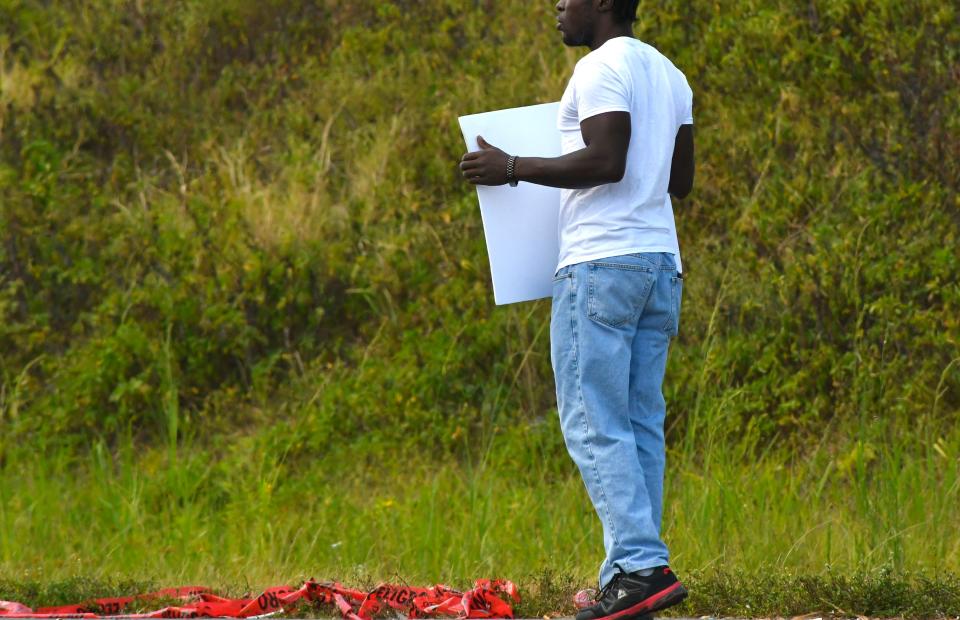
“We have seen an increase in anti-poverty, anti-homeless laws, over time, really across the board,” said Tristia Bauman, a senior attorney with the National Homelessness Law Center.
According to the organization’s report, about 83% of the 187 cities they surveyed in 2019 had at least one ordinance prohibiting panhandling. As of 2021, six states passed laws restricting it, and 24 states had at least one law restricting panhandling to specific areas.
Supporters have been cautious in how they have characterized their two measures, labeling them as public safety measures because courts have recognized that panhandling is a constitutionally protected activity.
Newly hired community affairs liaison for Melbourne: Liaison on homelessness departs position abruptly
Peter Vigue filed a federal lawsuit in U.S. District Court against the St. Johns County Sheriff’s Office challenging a rule that he needed a permit to panhandle in public. He won a permanent injunction when the court ruled the regulation was not sufficiently tailored to meet government’s compelling interest for safety.
“In America, we can’t arrest you for the words you have written down or the words that you say just because of the message you are communicating,” said Kirsten Anderson, lead counsel on the case when it was tried by Southern Legal Counsel. “These statutes are used as tools to arrest and criminalize people experiencing homelessness or poverty and that was an important issue.”
Anderson is now the economic justice deputy legal director with the Southern Poverty Law Center.
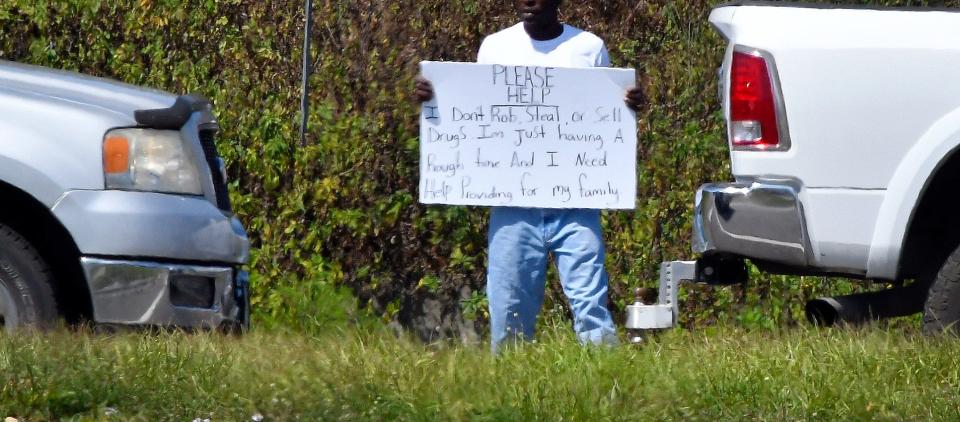
Realizing that, municipalities frequently cite public safety as the reason for the restrictions.
That more relevant case dealt with officials in Oklahoma City prohibiting panhandling on the medians of city streets on grounds of public safety.
Megan Lambert, legal director for the Oklahoma ACLU, which represented the plaintiffs said it was first proposed strictly as an anti-panhandling measure after officials received complaints about panhandlers at a specific intersection. They then altered it after the civil liberties union informed the city the law was unconstitutional.
They then modified the measure to exclude language pertaining to panhandling but prohibited, “sitting, standing, or staying on certain medians,” Lambert said.
Proposed panhandling ordinance: Melbourne officials endorse panhandling crackdown, brainstorm homelessness solutions
That version was equally unconstitutional because they created a broader restriction on protected conduct. The ACLU brought the lawsuit on behalf of not only panhandlers and people selling items on the medians, but also journalists and the libertarian party who collected signatures for ballots.
Freedom of speech is a right that receives the highest form of scrutiny, so when the government claims they have a compelling interest to limit it, such as public safety, they must do so as a last resort and must be done in the least burdensome way.
“What we were able to show the court in our case in Oklahoma City, is that the traffic safety was a justification and not a true government interest,” Lambert said. “In the 10 years prior, Oklahoma could not produce a single instance of someone being injured, or causing injury, by standing in a median. Yes, cities can claim compelling interest in traffic safety, but they have to show that interest is genuine.”
City officials had won in district court, but plaintiffs appealed the ruling to the federal appeals court and won, making the rule null and void.
In some respects, the Oklahoma City rule parallels that of the county
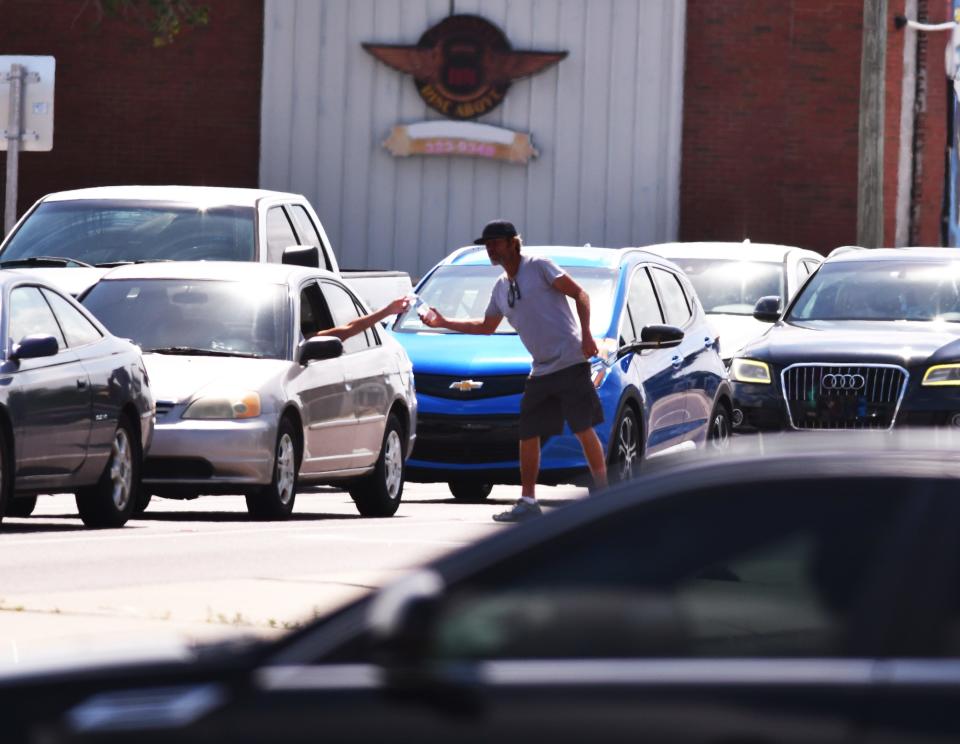
"What I read the Brevard County ordinance to mean is that speech activity that would be designed to elicit a physical item, like a donation of money, is restricted," Bauman said. "This could be challenged as a content-based speech restriction because it regulates speech based on the topic."
Another challenge could be based on the vagueness of the prohibition against impacting the "safe and efficient movement of vehicular traffic" under a due process theory.
'Multifaceted approach toward homelessness': Panhandling, homelessness complaints prompt Melbourne City Council special meeting
“I don’t know why cities keep doing this when it is so clear,” Anderson said. “Courts universally agree that if you are targeting panhandling specifically, that is unconstitutional.”
Ralph Chapoco is government and politics watchdog reporter. You can reach Chapoco at rchapoco@floridatoday.com and follow him on Twitter @rchapoco.
Support local journalism. Subscribe today.
This article originally appeared on Florida Today: Oklahoma City lost case after lawsuit challenging anti-panhandling law

